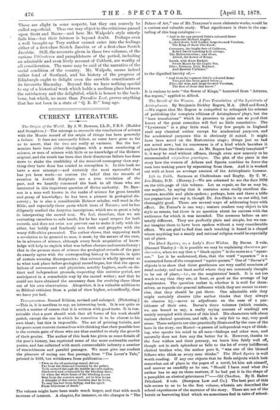Tennysoniana. Second Edition, revised and enlarged. (Pickering.) —This is, it
is needless to say, an interesting book. It is not quite so much a matter of coarse that it is written with good-taste. It is con- ceivable that a poet should wish that all forms of his work should perish, except the one in which he conceives it to be closest to his own ideal ; but this is impossible. The art of printing forbids, and the poets must content themselves with thinking that their possible loss is the certain gain of those who are thus enabled to study the growth of their genius. The author of this book has given us some details Of the poet's history, has reprinted some of the more noticeable earlier poems, and has collected with much commendable industry a number of resemblances and parallel passages. We must give our readers the pleasure of seeing one fine passage, from "The Lover's Tale," printed in 1833, but withdrawn from publication :— " Even as the all-enduring camel, driven Far from the diamond fountain by the palms, Toils onward through the middle moonlit nights, Shadowed and crimsoned by the blinding dust ; Or when the white heats of the blinding noone Beat from the concave sand; yet in him keeps A draught of that sweet fountain that he loves, To stay his feet from falling, and his spirit From bitterness of death."
The volume might have been made much larger, and that with mach increase of interest. A chapter, for instance, on the changes in "The Palace of Art," one of Mr. Tennyson's most elaborate works, would be a curious and valuable study. What significance is there in the cur- tailing of this long catalogue :—
" And in the sun-pierced Oriel's coloured flame Immortal Michael Angelo
Looked down. bold Luther, large-browed Verulam, The King of those who know, Cervantes, the bright face of Calderon, Robed David touching holy strings, The HalicarnassUan ; and alone, Alfred, the flower of Kings.
Isaiah, with fierce Ezekiel,
Swart Moses by the Coptic Sea, Plato, Petrarca, Livy. Raphael,
And Eastern IInfutzee."
to the dignified brevity of,— " And from the topmost Oriel's coloured flame Two god-like faces gazed below,—
Plato, the wise, and large-brewed Verulam, The first of those that know."
It is curious to note "the flower of Kings," borrowed from "Arttmus, flos regum," applied to Alfred.


































 Previous page
Previous page